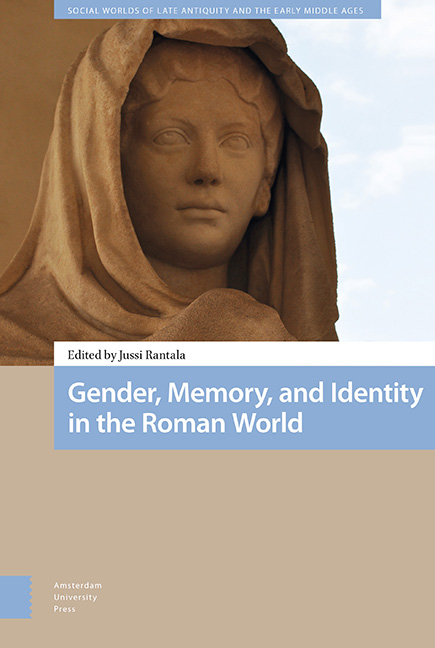Book contents
- Frontmatter
- Contents
- List of Illustrations
- Abbreviations
- Preface
- Tabula Gratulatoria
- Introduction
- 1 Public Agency of Women in the Later Roman World
- 2 Religious Agency and Civic Identity of Women in Ancient Ostia
- 3 The Invisible Women of Roman Agrarian Work and Economy
- 4 ‘Show them that You are Marcus’s Daughter’
- 5 Defining Manliness, Constructing Identities
- 6 ‘At the Age of Nineteen’ (RG 1)
- 7 Conflict and Community
- 8 Dress, Identity, Cultural Memory
- 9 The Goddess and the Town
- 10 Varius, multiplex, multiformis – Greek, Roman, Panhellenic
- 11 Mental Hospitals in Pre-Modern Society
- Index
10 - Varius, multiplex, multiformis – Greek, Roman, Panhellenic
Published online by Cambridge University Press: 20 November 2020
- Frontmatter
- Contents
- List of Illustrations
- Abbreviations
- Preface
- Tabula Gratulatoria
- Introduction
- 1 Public Agency of Women in the Later Roman World
- 2 Religious Agency and Civic Identity of Women in Ancient Ostia
- 3 The Invisible Women of Roman Agrarian Work and Economy
- 4 ‘Show them that You are Marcus’s Daughter’
- 5 Defining Manliness, Constructing Identities
- 6 ‘At the Age of Nineteen’ (RG 1)
- 7 Conflict and Community
- 8 Dress, Identity, Cultural Memory
- 9 The Goddess and the Town
- 10 Varius, multiplex, multiformis – Greek, Roman, Panhellenic
- 11 Mental Hospitals in Pre-Modern Society
- Index
Summary
Abstract
This paper will review how civic identity, ethnicity, and religious identity were debated and revalued during the Hadrianic era. The Panhellenic identity, promoted by Hadrian, was linked to a Hellenic identity and Greek history, but also to the mythic history of Rome. Emperor Hadrian promoted the development of multifaceted identities, being himself a representative of virtus and Romanitas, and a promoter of Greek paideia. The multiple identities of Hadrian, Empress Sabina, the emperor's beloved Antinoos, and their contemporaries reflect this development in culture, society, and religion: identity, gender, and memory got multifaceted interpretations, becoming fluid and flexible. This development continued in Late Antiquity, when memories of the Greek and Roman past were revived and reused in new contexts.
Keywords: Antinoos, construction of memories, Hadrian, identity, Sabina, Panhellenism
Introduction
This paper will review the changes in Roman society during the Hadrianic era, when civic identity, ethnicity, and religious identity were debated and revalued. Christian and Jewish identities became topics of official debate, as well as the Panhellenic identity promoted by Hadrian, which was linked to a Hellenic identity but also to the mythic history of Rome and the connection between Athens and Rome. Emperor Hadrian promoted the development of multifaceted identities. Although Hadrian himself was a representative of virtus and Romanitas, he was also a promoter of Greek paideia, and he was even called Graeculus. The multiple identities of Hadrian, Empress Vibia Sabina, the emperor's beloved Antinoos, and their contemporaries reflect this development in culture, society, and religion: how gender, memory, and identity got multifaceted interpretations, became fluid and flexible, and how they were reinterpreted in new and different social contexts.
This development of the Hadrianic age continued in Late Antiquity, when the memories from the Greek and Roman past of the Late Roman Empire were revived and reused in new contexts, Christian holy men were compared with mythic heroes or statues representing pagan gods were included in the decoration of private villas of Christian families.
- Type
- Chapter
- Information
- Gender, Memory, and Identity in the Roman World , pp. 283 - 300Publisher: Amsterdam University PressPrint publication year: 2019



